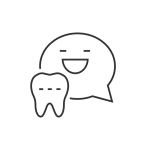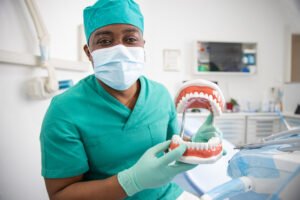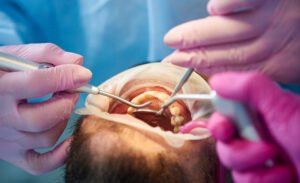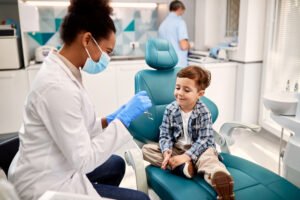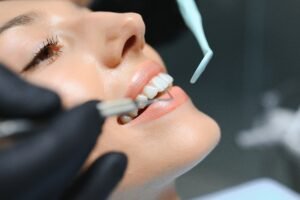Tooth decay is an all too common problem among elderly patients, and while it is a problem that can occur at any age, the elderly are particularly vulnerable. Tooth decay is caused by the build-up of plaque on the teeth, which can be caused by various factors, such as poor oral hygiene, a diet high in sugary or acidic foods, and a dry mouth.
It is important for elderly patients to be aware of the potential effects of tooth decay, including pain, infection, and difficulty eating, as well as its causes to prevent it. Regular visits to the dentist, strict oral hygiene practices, and a careful diet are all essential to maintaining healthy teeth and gums in elderly patients.
Tooth decay and gum disease are common issues among elderly individuals. Left untreated, these issues can affect an elderly person’s quality of life and increase their risk of serious health problems. These issues can lead to pain, difficulty eating and speaking, and in severe cases, tooth loss. However, there are steps that seniors can take to combat tooth decay and gum disease and maintain good oral health.
Let’s explore how senior citizens can ensure dental care
Cultivate oral hygiene
The best way to prevent and combat tooth decay and gum disease in the elderly is with proactive and consistent oral hygiene habits. This includes brushing the teeth at least twice a day, flossing at least once a day, and using mouthwash. Regular dental checkups and professional cleanings are also important for good oral hygiene and preventive measures such as fluoride and sealants.
Regular checkups
First and foremost, regular dental checkups and cleanings are essential for preventing and treating tooth decay and gum disease. As we age, our risk of developing these conditions increases, so it’s important to avail senior dental care by visiting the dentist at least twice a year. During these appointments, the dentist can detect and treat any issues that may be present, such as cavities or gum inflammation.
Control sugar intake
Elderly individuals should also be encouraged to reduce or eliminate sugary snacks and drinks from their diets. Sugary snacks and drinks contribute to tooth decay, as they provide fuel for the bacteria that cause cavities. Limiting or eliminating alcohol consumption can also prevent gum disease, as excessive alcohol consumption can irritate gums and lead to inflammation.
Remain proactive
The best way to prevent and combat tooth decay and gum disease in the elderly is with proactive and consistent oral hygiene habits. This includes brushing the teeth at least twice a day, flossing at least once a day, and using mouthwash. Regular dental checkups and professional cleanings are also important for good oral hygiene and preventive measures such as fluoride and sealants.
Know the side effects of medications
Lastly, it is important to note that certain medical conditions and medications can also affect oral health. Some medications increase saliva production, creating a moist environment in the mouth that encourages bacteria growth.
Other medications can cause dry mouth, leading to dry gums and an increased risk of gum disease. In both cases, medications should be managed with an eye toward optimizing oral health.
For example, diabetes and dry mouth can increase the risk of tooth decay and gum disease. Suppose you have a medical condition or are taking medications that may affect your oral health. In that case, it’s important to inform your dentist and work with them to develop a plan for maintaining good oral health.
What happens if tooth decay is not addressed
Tooth decay can cause various issues for older adults, including pain, infection, and difficulty eating.
Senior citizens must take care of their dental health to prevent tooth decay. Not doing so can lead to serious health conditions such as heart disease and diabetes.
- Pain and sensitivity: As the decay progresses, it can cause pain and sensitivity in the affected tooth. This can make it difficult for the elderly patient to eat and speak comfortably.
- Infection: If the decay reaches the inner layer of the tooth, known as the pulp, it can cause an infection. This can lead to an abscess, a pocket of pus that forms at the tip of the tooth’s root. Abscesses can cause fever and swollen lymph nodes. If left untreated, the infection can spread to other body parts and become life-threatening.
- Tooth loss: If the decay is not treated, it can eventually cause the tooth to fall out. This can make it difficult for the elderly patient to eat and speak and lead to a sunken-in appearance of the face.
- Gum disease: If the decay is not treated, it can also lead to gum disease. Gum disease is an infection of the tissues that support the teeth and can cause inflammation, bleeding, and, eventually, loss of teeth.
- Difficulty in chewing: In the case of elderly patients, tooth decay can make it difficult for them to chew their food. This can lead to poor nutrition and weight loss.
- Impact on mental health: Oral health issues can also impact mental health. Elderly patients with tooth decay may feel self-conscious about their appearance and avoid social interactions. This can lead to feelings of depression and isolation.
Conclusion
By preventing tooth decay and visiting the dentist regularly, elderly patients can maintain healthy teeth and gums and avoid costly dental treatments that may be necessary if left untreated. Tooth decay is a serious issue that should not be taken lightly, and by following the above steps, elderly patients can ensure that their teeth remain strong and healthy for years to come.
Port Dental offers comprehensive treatments for senior dental care. Our team of experienced dentists and hygienists provides personalized, comprehensive care tailored to the needs of senior patients. Services include preventive, restorative, and cosmetic dentistry, periodontal treatment and oral surgery.
Our team takes special care to provide a comfortable and safe treatment experience for our senior patients. We understand that dental care can be intimidating or stressful and take extra care to ensure every patient feels welcome and at ease during their visit.

